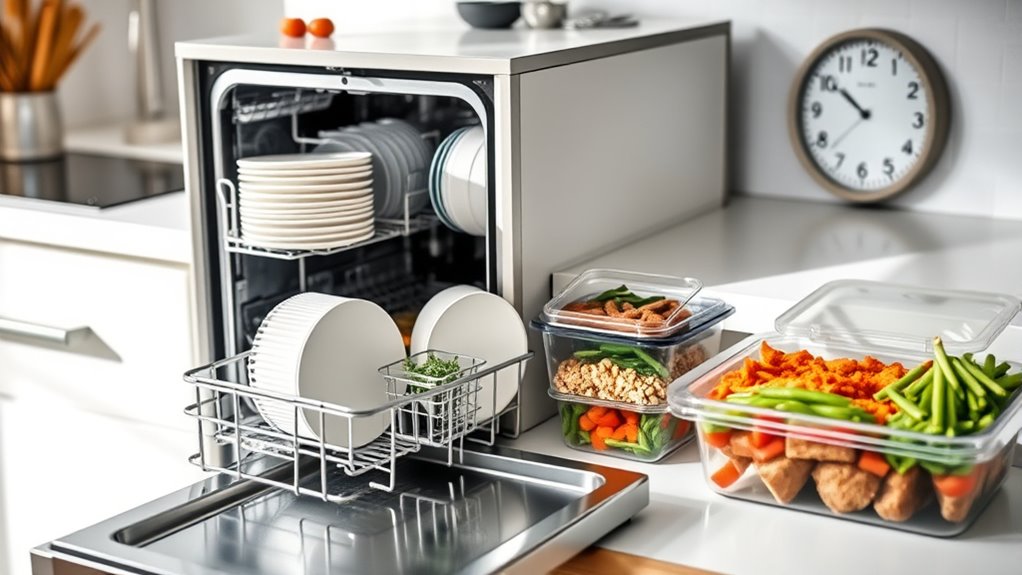To optimize your portable dishwasher with meal prep, load dishes immediately after each meal to keep clutter down and wait until you have a full load before starting it. Run the dishwasher during off-peak hours if possible, and activate eco modes for efficiency. Think about batching dishes from breakfast, lunch, and dinner for maximum water and energy savings. If you want to discover more tips to makes this routine even smoother, continue exploring.
Key Takeaways
- Batch dishes from multiple meals to maximize the portable dishwasher’s capacity and efficiency.
- Schedule dishwasher runs after main meals like dinner to keep countertops clear and dishes organized.
- Rinse dishes quickly before loading to reduce pre-wash time and improve cleaning performance.
- Use eco or energy-saving modes during full loads to conserve water and electricity.
- Plan load timing during off-peak hours for lower utility costs and sustainable usage.

If you’re looking to streamline your kitchen routine, portable dishwashers can be a game-changer, especially when combined with meal prep. One of the most effective ways to maximize their benefits is by timing your loads strategically. When you plan your dishwasher runs around your meal prep schedule, you reduce the number of cycles needed and ensure your kitchen stays organized and efficient. This approach not only saves time but also enhances energy efficiency and water conservation, which are critical for both your utility bills and the environment.
To start, consider batching your dirty dishes. After preparing multiple meals, wait until you have a full load before running your portable dishwasher. This practice guarantees you’re using the appliance as efficiently as possible, minimizing the number of cycles needed. It also helps you avoid running partial loads, which can waste resources. For instance, if you prep breakfast, lunch, and dinner dishes, rinse and load everything together at the end of the day. This way, each cycle handles a substantial amount of dishes, making the most of your dishwasher’s capacity.
Timing your loads also involves understanding your household’s meal schedule. Run the dishwasher after your main meal preparations, such as after dinner, to keep your kitchen tidy and free of clutter. By doing so, you prevent dirty dishes from piling up and creating unnecessary mess. Plus, running the dishwasher during off-peak hours, if your utility provider offers lower rates, can further improve energy efficiency and reduce your overall energy footprint.
Another tip is to utilize the dishwasher’s eco-friendly or energy-saving modes if available. These cycles are designed to use less water and energy, aligning with your goal of water conservation and energy efficiency. Combining these settings with well-timed loads amplifies your efforts to reduce resource consumption. Also, consider the water temperature setting; washing with cooler water not only uses less energy but also helps preserve your dishes and glasses.
Incorporating this timing strategy into your meal prep routine means you’re not only maintaining a clean kitchen but also being environmentally conscious. It’s a simple adjustment that yields significant benefits over time, saving you money and reducing your environmental impact. By batching your loads and scheduling them wisely, you make the most of your portable dishwasher’s capabilities, turning it into a powerful tool that supports your busy lifestyle while promoting sustainability.
Frequently Asked Questions
How Long Does a Typical Portable Dishwasher Cycle Take?
A typical dishwasher cycle duration varies, usually lasting between 1.5 to 2 hours, depending on the selected settings. You’ll want to take into account energy efficiency, as shorter cycles save power but may not thoroughly clean heavily soiled dishes. For ideal results, choose a cycle that balances cleaning performance and energy use. Always check your dishwasher’s manual for specific cycle times to guarantee you’re using it efficiently and effectively.
Can Portable Dishwashers Handle Large or Bulky Items?
They say “don’t bite off more than you can chew,” and that’s true with portable dishwashers. While some models can handle large items or bulky dishes, it’s not always ideal. You might need to remove or adjust racks to fit bigger items. Always check your dishwasher’s capacity and guidelines first, so you don’t risk damaging your machine or leaving your dishes unclean.
What Are the Best Times of Day for Running Loads?
You should run your dishwasher when noise won’t disturb others, like during daytime hours, especially if it’s loud. To save energy and reduce energy consumption, avoid peak electricity times, typically early evening. Running loads during off-peak hours not only minimizes dishwasher noise in your home but also helps you conserve money on energy bills. Timing your loads wisely ensures efficiency and peace of mind.
Do Portable Dishwashers Use More Water Than Hand Washing?
While hand washing might seem like it uses less water, portable dishwashers often excel in water efficiency, reducing overall water use. They are designed to minimize waste and have cycles tailored for different loads, lowering environmental impact. So, instead of thinking hand washing saves water, consider that a well-maintained portable dishwasher can be more eco-friendly, conserving resources and helping you reduce your environmental footprint.
How Do I Optimize Meal Prep Schedules Around Dishwasher Use?
To optimize your meal prep schedule around dishwasher use, plan your loads during downtime or after cooking sessions. Keep up with dishwasher maintenance to make sure it runs efficiently, saving water and energy. Load dishes immediately after meals to prevent buildup, and run full cycles for meal prep efficiency. This way, you streamline cleanup, reduce wait times, and make the most of your appliance without disrupting your meal planning flow.
Conclusion
By timing your portable dishwasher loads with meal prep, you can save up to 30 minutes daily, freeing you to enjoy more of your favorite activities. Imagine fitting in an extra workout or relaxing with a good book—all because you optimized your dishwashing schedule. When you coordinate these tasks efficiently, you’re not just saving time; you’re creating more space for what truly matters. Start planning your loads and watch your daily routine become smoother and more enjoyable.









